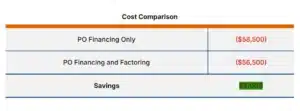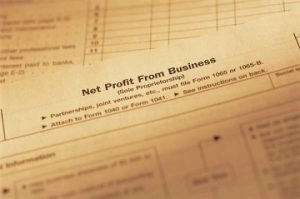Many small businesses have a cash flow emergency at one point or another. Unfortunately, these emergencies can even happen to companies that are well prepared. This article shows you how to obtain financing if your company needs immediate emergency funding. It also explains how to prevent some emergencies. We cover: 1. What is causing your […]
Blog
Should You Use Factoring with Purchase Order Financing?
Summary: Purchase order (PO) financing companies often advise prospective clients to work jointly with a factoring company. Combining both products can reduce the total financing cost of a transaction and provide additional capital to the company. However, settling a transaction through a factoring line only benefits some transactions. This article explains how a purchase order […]
Is Invoice Factoring Right for Your Business?
Invoice factoring is a business financing solution popular with small and midsize companies. This article helps you determine if factoring is the right solution for your business. We guide you through eight questions to ask before considering a factoring facility. 1. Can my cash flow problem be fixed using factoring? The first question to ask […]
Are Factoring Rates That Important?
Most prospective clients consider the factoring rate the most important feature of a plan. In fact, pricing is usually the first question clients ask prospective finance companies. Seeking the best rate is a good strategy, but it should not be the only detail you look for. Other parts of a plan are just as important. […]
Self-Employed Business Financing Options
Summary: Many self-employed entrepreneurs will need financing at some point in their careers. Unfortunately, self-employed freelancers don’t have many financing options. Lenders often prefer working with larger companies because they have ample collateral and longer track records. This article discusses two solutions: SBA Microloans and invoice factoring. Both can meet the needs of many freelancing […]
Why Do Factoring Companies Ask for Tax Documents?
Prospective clients are often surprised when a factoring company asks for copies of their tax documents during the application process. Factoring companies may ask for the following documents where applicable: A prospective client’s confusion about this requirement is understandable. After all, why does a company that is financing your invoices need information about your company’s […]
Finance a Freight Brokerage with Factoring
Summary: Running a freight brokerage requires careful management. As a broker, you are in the middle of a transaction, balancing the demands of your shippers and carriers. Aside from the obvious logistical problems, this situation can also create cash flow problems. This article discusses how to finance a growing freight brokerage and solve the most […]
How to Handle a Business Cash Shortage with Factoring
Summary: Most companies have a cash shortage at one time or another. Cash shortages often happen to companies that add customers quickly and outgrow its cash reserve. Cash shortages can lead to further problems if not fixed correctly. This article provides practical strategies to prevent cash shortages. It also explains how to handle a cash […]
Why Do Factoring Companies Hold a Reserve?
Most factoring transactions don’t use a full advance. Instead, they advance less than 90% of the invoice and hold the rest as a reserve. This reserve is rebated once the transaction settles. The reserve is an essential component of a factoring transaction. It reduces the chances of having settlement problems. This article explains how the […]
What is Medical Factoring?
Medical factoring helps companies that bill private insurance companies, Medicare, or Medicaid, and have cash flow problems due to slow payments. This type of financing is commonly used by healthcare providers and medical professionals of all specialties. 1. What problem does medical factoring fix? One of the greatest challenges for companies in the healthcare industry […]















